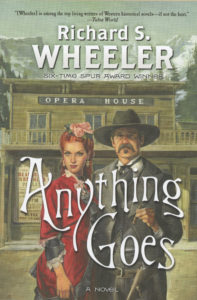
Prolific Livingston writer Richard Wheeler – six-time winner of the Spur Award – follows a beleaguered vaudeville troupe through its final few shows in Montana and Idaho. Part playful romp, part tribute to the audacity and fortitude of vaudeville performers, Anything Goes offers a behind-the-scenes look at an art form in the midst of monumental change.
The story opens in Helena, where August Beausoleil and partner Charles Pomerantz are staging a show at the Ming Opera House. The response is lackluster until Mrs. McGivers’s capuchin monkeys begin hurling rotten fruit at the audience. Add a scathing review in the Independent, and the opera house is suddenly brimming with patrons, eager for a little comedy, talent and outrage – or as a local pastor proclaims, “an effort to Frenchify and Latinize good American tastes” – on a cold winter night.
The Beausoleil Brothers Follies travels to the Mining City next, where it loses its most famous member, “nightingale” Mary Mabel Markey, who drops dead of a heart condition on the stage of Maquire’s Grand Opera House. As the troupe scrambles to add acts and reconfigure the show, a mysterious young singer appears, captivating not only Pomerantz, but audiences as well.
Beausoleil deftly balances a quirky cast of performers, including comedy acts, a scimitar juggler, the Wildroot Sisters (replete with an over-the-top stage mother) and a talented trio of tap dancers. But bad news is arriving from the West Coast, where powerful impresarios are buying up theaters on the vaudeville circuit, squeezing the small troupes out of business.
Wheeler writes sympathetically about the hardships and eccentricities of this late 1800s phenomenon. As the cultivated young singer at its center discovers, “Vaudeville was for all people … it was broad, earthy, universal and fun.”
Wheeler has written more than 50 novels and holds the Owen Wister Award for lifetime contributions to the literature of the West.
– Kristi Niemeyer